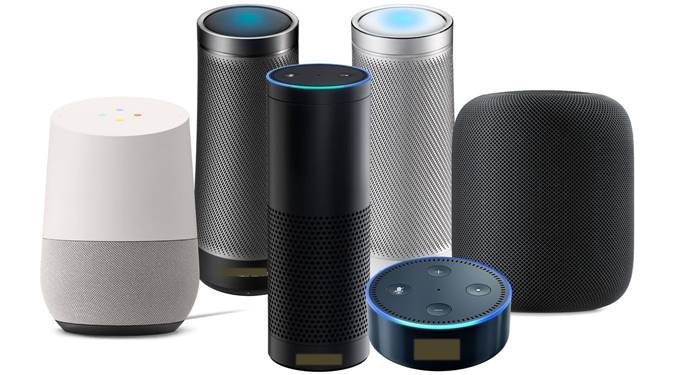
Smart technology and personal gadgets are becoming increasingly popular. Yet, the features and connectivity that make them attractive could also potentially expose a treasure trove of personal information. As consumers, we may need to determine what’s more important: our personal privacy or a device’s functionality. Learn more about possible vulnerabilities for some gadgets on your wish list and tips that could spare your personal information from being exposed.
Smart Speakers
Smart speakers such as Amazon’s Echo and Google’s Home have numerous uses to make life easier, like turning on music or reading the day’s headlines. These devices constantly listen to their surroundings to determine if the respective trigger word, “Alexa…” or “OK, Google…” have been said, processing your commands through the cloud by sending them over the internet to their servers. Each interaction is stored in a database to teach the device your speech and use patterns, which helps the device function better. While this data customizes your smart speaker, anyone with access to your device’s account can see your search history and hear all previous commands – even ones that sounded like a command but weren’t.
Word to the wise:
Periodically clearing search data can help prevent unauthorized access, but some convenience will be lost as the device is “forgetting” things that tailor the experience. You can also turn off the microphone button to stop it from listening, but then the device is no longer available at your command. Perhaps consider disabling or requiring a pin to complete voice purchases and network features to help further protect your wallet and privacy.
Video Call Displays
Smart displays specifically for video calls, such as Facebook’s Portal, are new to the market and work similarly to smart speakers in that they awaken upon command to call other users in the network. The built-in camera can adjust and follow your movement around a room during the conversation.
Word to the wise: As with smart speakers, users who are uncomfortable with an always-on microphone and open camera lens at home can mute and cover them, respectively, and delete call history. Portal runs on Facebook’s encrypted Messenger platform which streams calls over an internet connection. Facebook can’t record your calls, but it does track call length and participants. Because Facebook has faced a number of user privacy concerns and breaches over the years, experts recommend occasionally reviewing your account privacy settings.
Fitness Trackers
Fitness trackers range from purpose-built devices that track your steps, heartbeat and sleeping patterns to smart watch apps or features that monitor all of the above and more.
Word to the wise: Regardless of which brand best suits your needs, fitness trackers are fairly secure. Smart watches such as the Apple Watch typically encrypt data exchanged between the watch and connected phone. More traditional trackers, like Fitbit, also encrypt your data, but are more likely to anonymize and sell it to third parties.
DNA Testing Kits
The highest stakes for your personal privacy have nothing to do with gadgets. At-home DNA testing kits from companies including 23andMe, Ancestry and others offer consumers information about their ancestry or genetic vulnerabilities to certain health issues based on a submitted DNA sample (usually saliva).
Word to the wise: While your results may answer some important personal questions, they could have a lasting impact on your privacy and future. Users’ results are stored in databases and are increasingly of interest to law enforcement agencies and pharmaceutical and healthcare companies. Depending on the respective privacy policy, your anonymized results can be shared and even sold without further consent.
Another way your DNA kit results could impact you: insurance coverage. Federal law protects consumers from having to provide genetic information to determine possibility or cost of coverage for health insurance, but that protection doesn’t apply to long-term-care policies, life insurance or disability insurance. Consumers considering using a DNA testing kit should fully understand all privacy implications and consider consulting with healthcare, legal, insurance and financial professionals.
General Security Tips
Our homes, phones and other personal devices will likely continue to get smarter as technology advances – so to help protect your privacy, experts recommend the following general guidelines:
- Cover cameras, turn off microphones or even unplug devices when not in use
- Check default privacy settings
- Periodically delete your usage data
- Research and understand privacy policies before making a purchase
If you have any questions, please give Garry a call at 858-450-9711 or email him at garry@kachkovskyandfisher.com.
Post sponsored by Certified Financial Planner (CFP) Garry Kachkovsky. If you have questions regarding financial planning or investment management, give Garry a call at 858-450-9711 or email at garry@kachkovskyandfisher.com. For more information, visit http://www.kachkovskyandfisher.com/
Kachkovsky & Fisher is a Registered Investment Advisory Firm. This information is general in nature, is not a complete statement of all information necessary for making an investment decision, and is not a recommendation or a solicitation to buy or sell any security. Investments and strategies mentioned may not be suitable for all investors. Past performance may not be indicative of future results. Investors should consider the investment objectives, risks, charges and expenses associated with savings plans before investing.
For more information about Sponsored Posts and the three ways that UCCA can help promote your business, visit https://www.universitycitynews.org/2017/09/15/promote-your-business-when-you-advertise-in-the-university-city-newsletter/


